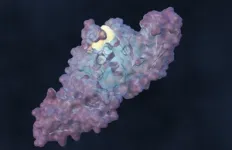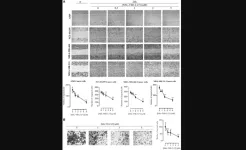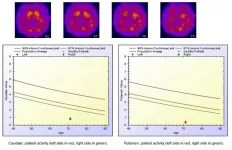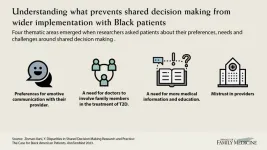(Press-News.org) A team of scientists led by the Department of Energy’s Oak Ridge National Laboratory designed a molecule that disrupts the infection mechanism of the SARS-CoV-2 coronavirus and could be used to develop new treatments for COVID-19 and other viral diseases.
The molecule targets a lesser-studied enzyme in COVID-19 research, PLpro, that helps the coronavirus multiply and hampers the host body’s immune response. The molecule, called a covalent inhibitor, forms a strong chemical bond with its intended protein target and thus increases its effectiveness as an antiviral treatment.
“We’re attacking the virus from a different front, which is a good strategy in infectious disease research,” said Jerry Parks, who led the project and heads the Molecular Biophysics group at ORNL.
The research, detailed in Nature Communications, turned a previously identified noncovalent inhibitor of PLpro into a covalent one with higher potency, Parks said. Using mammalian cells, the team showed that the inhibitor molecule limits replication of the original SARS-CoV-2 virus strain as well as the Delta and Omicron variants.
The ORNL scientists used computational modeling to predict whether their designs would effectively bind to the enzyme and disrupt its function. They then synthesized the molecules and tested them at ORNL and partner company Progenra to confirm their predictions.
The protein was expressed and purified using the capabilities of the Center for Structural Molecular Biology at the Spallation Neutron Source, or SNS, at ORNL. The bright X-rays generated by the Stanford Synchrotron Radiation Lightsource, or SSRL, at SLAC National Accelerator Laboratory were used to map the molecule and examine the binding process at an atomic level, validating the simulations. The SNS and SSRL are DOE Office of Science user facilities.
Partners at the University of Tennessee Health Science Center and Utah State University performed the testing on mammalian cells infected with the virus. Other collaborators on the project include the Stanford University School of Medicine, Los Alamos National Laboratory, Brookhaven National Laboratory, the University of Chicago, Argonne National Laboratory, Lawrence Berkeley National Laboratory and Northeastern University.
“We took an existing compound and made it more potent by designing it to form a new chemical bond with PLpro,” said ORNL chemist and lead author Brian Sanders. “Our efforts are now to build on what we have developed to make better compounds that could one day be taken as a pill.”
Other ORNL scientists who collaborated on the project are Russell Davidson, Kevin Weiss, Qiu Zhang and Hugh O’Neill, while Audrey Labbe, Connor Cooper, Gwyndalyn Phillips, Stephanie Galanie and Marti Head are former staff.
Preparing for future virus outbreaks
The researchers are already working on a second generation of the covalent PLpro inhibitor that is more stable and better absorbed and distributed by the body, aiming to improve its suitability as an oral drug under the ORNL Technology Innovation Program.
The same design strategy of identifying a molecule, understanding how it binds to a target, and modifying it to make it more effective could be applied to understanding and combatting future viruses, the scientists noted.
“Antiviral drug discovery will always be needed and was one of the main motivations for this project,” Parks said.
“If a new coronavirus emerges, our models and compounds can be used to continue the efforts for new antiviral drugs,” Sanders said. “We are working on checking the boxes that a potential industry or pharmaceutical partner would want to see. I find that very exciting.”
This research was supported by the National Virtual Biotechnology Laboratory, a group of DOE national laboratories focused on responding to the COVID-19 pandemic with funding provided by the Coronavirus CARES Act; as well as DOE’s Office of Science, Office of Basic Energy Sciences and Office of Biological and Environmental Research. Additional support was provided by the National Institutes of Health’s National Institute of General Medical Sciences.
UT-Battelle manages ORNL for DOE’s Office of Science, the single largest supporter of basic research in the physical sciences in the United States. The Office of Science is working to address some of the most pressing challenges of our time. For more information, please visit energy.gov/science.
END
ORNL-led team designs molecule to disrupt SARS-CoV-2 infection
2023-03-28
ELSE PRESS RELEASES FROM THIS DATE:
Researchers discover two subtypes of insulin-producing cells
2023-03-28
GRAND RAPIDS, Mich. (March 28, 2023) — A team led by Van Andel Institute and Max Planck Institute of Immunobiology and Epigenetics scientists has identified two distinct subtypes of insulin-producing beta cells, or ß cells, each with crucial characteristics that may be leveraged to better understand and treat Type 1 and Type 2 diabetes.
ß cells are critical guardians of the body’s metabolic balance. They are the only cells capable of producing insulin, which regulates blood sugar levels by designating dietary sugar for immediate use ...
Extinction of steam locomotives derails assumptions about biological evolution
2023-03-28
LAWRENCE — When the Kinks’ Ray Davies penned the tune “Last of the Steam-Powered Trains,” the vanishing locomotives stood as nostalgic symbols of a simpler English life. But for a paleontologist at the University of Kansas, the replacement of steam-powered trains with diesel and electric engines, as well as cars and trucks, might be a model of how some species in the fossil record died out.
Bruce Lieberman, professor of ecology & evolutionary biology and senior curator of invertebrate paleontology at the KU Biodiversity Institute & Natural History Museum, sought to use steam-engine history to test the merits of “competitive exclusion,” ...
aOncotarget | Polyisoprenylated cysteinyl amide inhibitors deplete g-proteins in cancer cells
2023-03-28
“[...] mutations in G-proteins have been associated in the progress of several cancers [...]”
BUFFALO, NY- March 28, 2023 – A new research paper was published in Oncotarget's Volume 14 on March 24, 2023, entitled, “Polyisoprenylated cysteinyl amide inhibitors deplete singly polyisoprenylated monomeric G-proteins in lung and breast cancer cell lines.”
Finding effective therapies against cancers driven by mutant and/or overexpressed hyperactive G-proteins remains an area of active research. Polyisoprenylated cysteinyl amide inhibitors (PCAIs) are agents that mimic the essential posttranslational ...
Molecular imaging offers insight into chemo-brain
2023-03-28
Reston, VA—A newly published literature review sheds light on how nuclear medicine brain imaging can help evaluate the biological changes that cause chemotherapy-related cognitive impairment (CRCI), commonly known as chemo-brain. Armed with this information, patients can understand better the changes in their cognitive status during and after treatment. This summary of findings was published ahead-of-print by The Journal of Nuclear Medicine.
CRCI describes a clinical condition characterized by memory and concentration impairment, difficulties with information processing ...
Climate-related costs could significantly affect largest listed livestock companies
2023-03-28
IIASA researchers collaborated with the FAIRR Initiative – a collaborative investor network – on the development of a new IPCC-aligned climate risk analysis tool for investors. Analyses done using the new tool, show that climate-related cost increases could significantly affect the bottom lines of the largest listed livestock companies unless new strategies are urgently adopted.
The FAIRR Initiative today launched an enhanced iteration of its Coller FAIRR Climate Risk Tool providing investors with company-level data on how climate risks may impact costs and ...
COVID pandemic highlighted the need for more school nurses
2023-03-28
The study surveyed school nurses working across the UK about their current working practices and experiences of working during the pandemic.
Dr Sarah Bekaert RN, Senior Lecturer in Child Health at Oxford Brookes University, said: “This research has highlighted the vital role school nurses play in the identification and prevention of issues that are likely to negatively impact young people as they navigate their teenage years, and then transition into adulthood.
“Our findings call for advocacy by policymakers and professional organisations ...
March/April 2023 Annals of Family Medicine Tip Sheet
2023-03-28
Understanding What Prevents Shared Decision Making From Wider Implementation With Black Patients
To understand the perspectives of Black patients on shared decision making (SDM) during medical appointments, researchers and clinicians investigated the preferences, needs and challenges around SDM as experienced by Black individuals. The team also offers possible adaptations and modifications for SDM models, practice and research within Black communities. The study team recruited 32 Black patients – 18 men and 17 women – with type ...
Illinois researchers achieve the first silicon integrated ECRAM for a practical AI accelerator
2023-03-28
The transformative changes brought by deep learning and artificial intelligence are accompanied by immense costs. For example, OpenAI’s ChatGPT algorithm costs at least $100,000 every day to operate. This could be reduced with accelerators, or computer hardware designed to efficiently perform the specific operations of deep learning. However, such a device is only viable if it can be integrated with mainstream silicon-based computing hardware on the material level.
This was preventing the implementation of one highly promising deep learning ...
PLOS Global Public Health and PLOS Digital Health now indexed in PubMed Central
2023-03-28
SAN FRANCISCO – The Public Library of Science (PLOS) is pleased to announce that PLOS Global Public Health and PLOS Digital Health are now fully indexed in PubMed Central (PMC), expanding our reach and furthering our mission of ensuring research content is accessible and discoverable as widely as possible.
Both journals have an explicit mandate to promote equity in research that can tackle the most urgent priorities for the field, such as access to healthcare, or addressing bias in AI and developing machine learning tools for underserved communities. PLOS is proud to feature ...
Some coastal salt marshes are keeping up with sea level rise — for now
2023-03-28
American Geophysical Union
Press Release 23-12
28 March 2023
For Immediate Release
This press release is available online at: https://news.agu.org/press-release/some-coastal-salt-marshes-are-keeping-up-with-sea-level-rise-for-now
Some coastal salt marshes are keeping up with sea level rise — for now
Salt marshes on the U.S. East Coast have accumulated soil more quickly over the past century, and some appear to be keeping pace with rising waters. But that won’t last forever.
AGU press contact:
Rebecca Dzombak, +1 (202) ...








